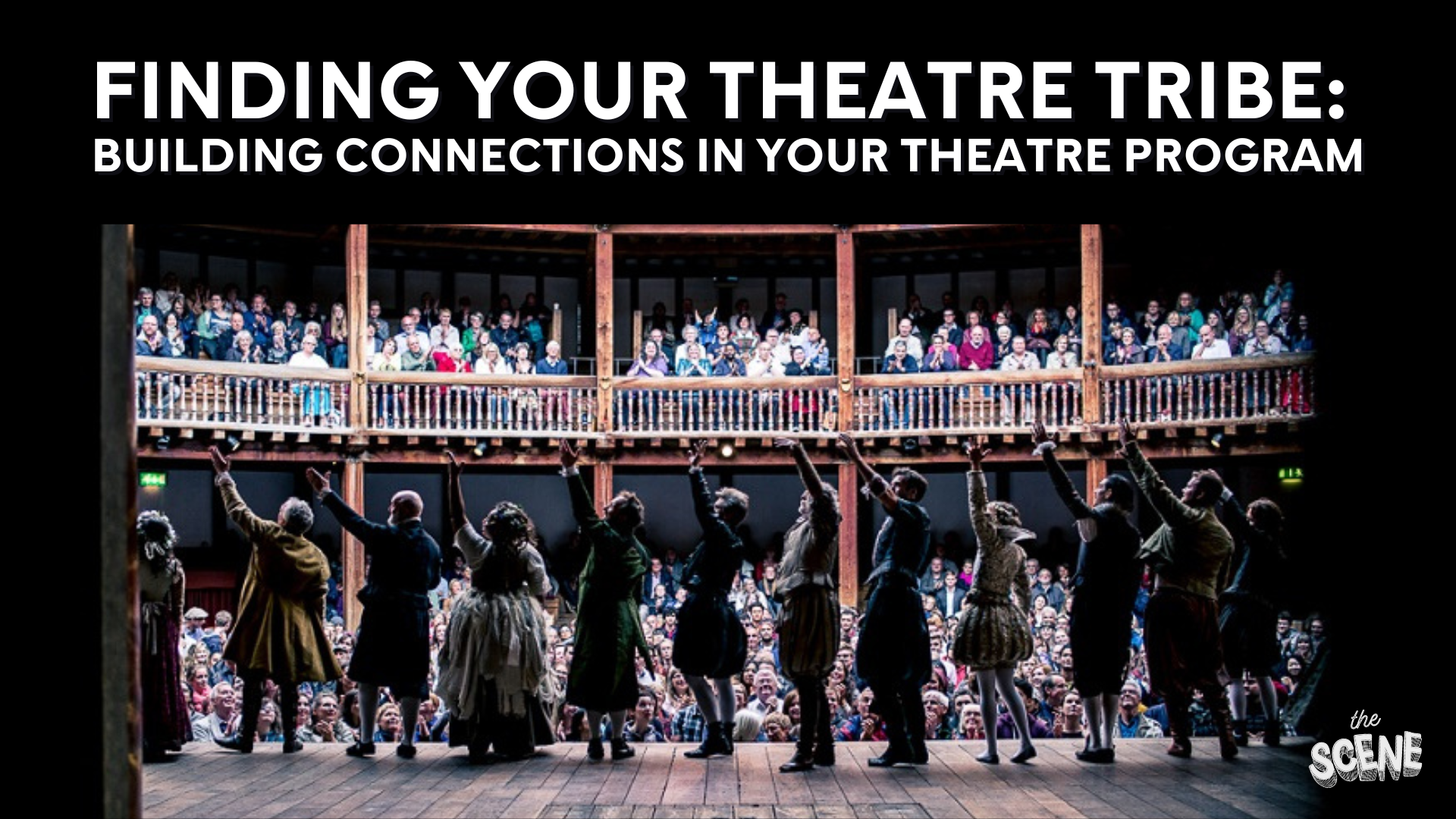by Zach Dulli, The Scene
Whether you’re a student stepping onto the stage for the first time or a teacher guiding a new group through a production, one of the most important aspects of any theatre journey is building your “tribe.” Theatre isn’t just about the performances or the applause—it’s about the connections you make, the collaborations you engage in, and the supportive community you help to foster. Here’s how students and their teachers can work together to create a meaningful and thriving theatre community.
Get Involved Beyond the Stage
- For Students: Explore various aspects of theatre beyond acting. Whether it’s set design, lighting, costumes, stage management, or production marketing, getting involved in different areas broadens your skills and introduces you to new people. The more you engage in the many facets of production, the more connections you’ll build.
- For Teachers: Encourage your students to explore all aspects of theatre production. Facilitate opportunities for them to try different roles and support their involvement in areas outside their usual comfort zone. This enhances their learning experience and fosters collaboration and camaraderie within the group.
Be Open and Approachable
- For Students: Approach your peers and teachers openly. Engage in casual conversations before and after rehearsals, and be willing to reach out if you see someone who might need a bit more support or encouragement. Small acts of kindness usually lead to deeper connections and make you a leader in your program.
- For Teachers: Create an environment where students feel comfortable approaching you and each other. Encourage open communication and foster a classroom or rehearsal space where everyone feels valued and heard. Your approachability sets the tone for a supportive community.
Form Study and Discussion Groups
- For Students: Join or form study groups focusing on academic and theatrical topics. Discussing plays, performances, and theatre history can deepen your understanding and bring you closer to your peers. These groups often become close-knit communities where members support each other academically and emotionally.
- For Teachers: Facilitate forming study groups or discussion circles within your classes or drama club. Guide students in leading and participating in these groups effectively, ensuring they are both educational and supportive. This fosters a sense of responsibility and collaboration among students.
Attend Theatre Events Together
- For Students: Attend local plays, film screenings, and theatre conferences with your teachers and peers. These shared experiences provide a great way to bond outside class or rehearsal. Discussing and debating different aspects of theatre can strengthen your collaborative relationships.
- For Teachers: Organize group outings and theatre events. Attend the local community theatre’s fall play or see the musical a nearby college or high school puts on. Use these experiences as opportunities for students to bond and learn together. Facilitate discussions afterward to deepen their understanding and appreciation of the art form.
Be a Team Player
- For Students: Theatre is a collaborative art form, so be the person who helps others, whether it’s running lines, helping with set changes, or offering to drive someone home after a late rehearsal. Your willingness to contribute and support others will build a reputation as a reliable and enjoyable collaborator.
- For Teachers: Model and reinforce the importance of teamwork in your productions. Highlight and praise examples of students supporting one another. Encourage a culture where everyone’s contributions are recognized and valued, whether on stage or behind the scenes.
Create and Maintain Traditions
- For Students: Start or participate in traditions within your drama department. Whether it’s a pre-show ritual, a cast dinner, or a backstage game, these traditions create a sense of belonging and continuity. They become cherished memories that bind you and your theatre family together.
- For Teachers: Support and celebrate traditions that foster community within your drama program. These rituals can become powerful tools for building a cohesive and supportive group. Encourage students to take ownership of these traditions, which can become a meaningful part of your program’s culture.
Communicate Openly and Honestly
- For Students: Share your ideas, ask for help when needed, and be willing to listen to others. Open and honest communication improves your experience and contributes to a positive environment for everyone involved. Your peers and teachers will appreciate your willingness to engage in meaningful dialogue.
- For Teachers: Promote a culture of open communication in your program. Create spaces where students feel comfortable sharing their ideas and concerns. Model effective communication skills and be receptive to feedback from your students. This builds trust and strengthens the overall community.
Celebrate Each Other’s Successes
- For Students: Celebrate the achievements of your peers, whether they landed a role you wanted or nailed a difficult scene. Lifting others contributes to a supportive culture where everyone feels valued and encouraged to do their best.
- For Teachers: Recognize and celebrate the successes of all your students, both big and small. Whether it’s a standout performance or a behind-the-scenes contribution, acknowledging their efforts fosters a positive and inclusive atmosphere. Encourage students to do the same for each other.
Be Yourself
- For Students: Theatre is a space where authenticity is celebrated. Embrace your unique personality, talents, and quirks. When you are true to yourself, you’ll attract others who appreciate you for who you are, leading to deeper and more genuine connections.
- For Teachers: Create an environment where students feel safe to express themselves authentically. Please encourage them to bring their unique perspectives to their performances and collaborations. Valuing individuality helps students build confidence and forge meaningful connections with their peers.
Building a Thriving Theatre Community
Building a thriving theatre community in your school requires student and teacher effort. By engaging with all aspects of theatre, being open and supportive, and embracing authenticity, you can create a theatre family that enhances the experience for everyone involved. These connections will enrich students’ time in the drama program and provide a support system that extends beyond the stage. For teachers, fostering these relationships will strengthen your program and create a lasting impact on your students’ lives. Together, you can build a theatre tribe that makes every production, rehearsal, and class a rewarding and memorable experience.









